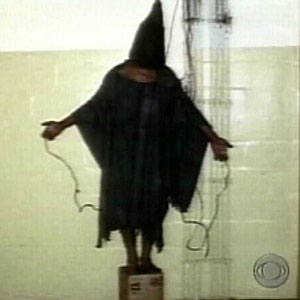
When the Abu Ghraib scandal broke (April/May 2004), I happened to be taking a subject in American politics. I recall my lecturer remarking that in the chessgame of the War on Terror, prisoner abuse was an incredibly stupid move on the US government's part, and that those photos would bedevil US foreign policy for decades to come. He's right on both counts, but he could have taken the point further. America's peeling back of interrogation constraints was indeed stupid, but it was also meticulously planned by intelligent people.
Any claim that Abu Ghraib was an isolated incident - still the Pentagon and White House line - can be thrown on the trashheap of right-wing denial. Aside from the blooming array of secondary books on the subject, a paper trail of the Bush administration's orchestrated rollback of anti-torture provisions in international and US domestic law can be found in The Torture Papers. Or if you're lazy, you can watch Frontline's The Torture Question, which screened on ABC tonight and prodded me into writing this post. PBS being America's friendly taxpayer-funded channel, the entire program can be found here, conveniently broken into 10 minute chunks.
Like all good documentaries, The Torture Question complements the printed word by putting you in the grit of the action. It includes interviews with GTMO prison bosses, Janis Karpinski and the first (ex) US military interrogator to go public about what's happening. What comes through most - apart from the repulsiveness of the acts themselves - is the collusion at every level of the system, notwithstanding that once the scandal broke the grunts who'd got their hands dirty were hung out to dry by their superiors. The general tone recalled a piece I once read about the response of German soldiers asked why they committed atrocities on the Eastern Front: essentially, "everyone else was doing it".
Any claim that Abu Ghraib was an isolated incident - still the Pentagon and White House line - can be thrown on the trashheap of right-wing denial. Aside from the blooming array of secondary books on the subject, a paper trail of the Bush administration's orchestrated rollback of anti-torture provisions in international and US domestic law can be found in The Torture Papers. Or if you're lazy, you can watch Frontline's The Torture Question, which screened on ABC tonight and prodded me into writing this post. PBS being America's friendly taxpayer-funded channel, the entire program can be found here, conveniently broken into 10 minute chunks.
Like all good documentaries, The Torture Question complements the printed word by putting you in the grit of the action. It includes interviews with GTMO prison bosses, Janis Karpinski and the first (ex) US military interrogator to go public about what's happening. What comes through most - apart from the repulsiveness of the acts themselves - is the collusion at every level of the system, notwithstanding that once the scandal broke the grunts who'd got their hands dirty were hung out to dry by their superiors. The general tone recalled a piece I once read about the response of German soldiers asked why they committed atrocities on the Eastern Front: essentially, "everyone else was doing it".
1st ANONYMOUS INTERVIEWEE: I mean, you had a lot of rank there. You know, we're not talking about just a few officers and a lot of soldiers. There was a lot of officers, high-ranking officers, a lot of senior NCOs all over the place. And none of them had a problem, seemingly, with what was going on.
While it wears its sympathies on its sleeve, The Torture Question does give airtime to those who say the Geneva Conventions should not apply in the War On Terror, because the enemy cannot be distinguished. But this is precisely why they should apply. The fact that America was attacked on September 11 is used as a smokescreen to hide the fact that the US is defining the targets of its response. Labelling the inmates of Abu Ghraib or Camp X-Ray 'terrorists' sets up a clasic straw man - for the purposes of principled debate we do not know that they are terrorists, even if in practice many fall somewhere along a reasonable spectrum of US security threats.
When we get to the essence of torture, however, the guilt of the victim is irrelevant. As put by John McCain - one of those rare pollies whose integrity has survived Capitol Hill - this isn't about who they are, it's about who we are. Torture is about asserting power by destroying another human being; it is not a utilitarian device that can be switched on and off as circumstances require. The word is derived from the Latin verb "to twist"; the image is of the rack, still common in late-18th century Europe, that America's founding fathers had in mind when they wrote article VIII of the Bill of Rights.
Rather than going on in this vein I'll direct readers to the Victorian Foundation for Survivors of Torture, whose director puts the case more eloquently than I ever could. The only insight I'll add draws on my reading into why Europe made the leap into the modern world, where other larger, wealthier and more technically advanced societies failed. If there's one cultural reason for the West's success it's because in Europe, for all its Bastilles and witchhunts, one couldn't be stretched out and bastinadoed to death at a despot's whim. That is exactly what happened, in principle if not literally, at Abu Ghraib. It continues to happen across the global detention empire run by the CIA and the US military; now outside it, too, if The Torture Question's testimony is accurate.
When we get to the essence of torture, however, the guilt of the victim is irrelevant. As put by John McCain - one of those rare pollies whose integrity has survived Capitol Hill - this isn't about who they are, it's about who we are. Torture is about asserting power by destroying another human being; it is not a utilitarian device that can be switched on and off as circumstances require. The word is derived from the Latin verb "to twist"; the image is of the rack, still common in late-18th century Europe, that America's founding fathers had in mind when they wrote article VIII of the Bill of Rights.
Rather than going on in this vein I'll direct readers to the Victorian Foundation for Survivors of Torture, whose director puts the case more eloquently than I ever could. The only insight I'll add draws on my reading into why Europe made the leap into the modern world, where other larger, wealthier and more technically advanced societies failed. If there's one cultural reason for the West's success it's because in Europe, for all its Bastilles and witchhunts, one couldn't be stretched out and bastinadoed to death at a despot's whim. That is exactly what happened, in principle if not literally, at Abu Ghraib. It continues to happen across the global detention empire run by the CIA and the US military; now outside it, too, if The Torture Question's testimony is accurate.
Spc. ANTHONY LAGOURANIS: Part of it is, they were trying to get information, but part of it is also just pure sadism. You just kept wanting to push and push and push and see how far you could go. It's natural for people to reach an intense level of frustration when you're sitting there with somebody that you feel you have total control over and total power over, and you can't get him to do what you want. And that you do that all day, every day. And at some point, you want to start raising the stakes.

2 comments:
Perhaps the issue is not that USA uses torture as a tool for war nor is it that the torture was state sanctioned (perhaps) but rather that we (the public) found out.
When the images came out on TV, I like many others were horrified, but not at all surprised. Like you said torture is as old as war itself, it is hard to think of any human rights abuses that have not involved torture and it is even harder to think of a war where human rights were not abused.
Some say that the only thing that has changed in the last 100 odd years is the mass media coverage of war and as such the issue of torture has come to light. But come on, that is an incredibly naive statement, I mean did not kings and emperors of old flog enemies to death in public! Words such as "impaled", "defenestrated" and "flayed" were present long before the 20th century mass media.
So torture, and awareness of torture has being going on for centuries, maybe what has changed is our attitudes and so called morals. It is unthinkable to some that the US would abuse human rights but perfectly justified for Saddam to do so. Why? Really what makes the US so much more "pure" than Saddam? Is it genuine morality and regard for the fellow man or is it just a media illusion?
By the way... hi John nice to finally reply to your blog.
Steve
hi CS, are you a Steve I happen to know personally?
Pretty much every society has in the past indulged in practices now recognised as torture. My point about the bastinadoes was that giving individuals untramelled power over other individuals - the essence of torture - has destructive effects on society as a whole. Western Europe has its own dark history in this regard, but for a variety of reasons it enjoyed greater restraints on arbitrary power than did other societies, and it's no coincidence that capitalism, accountable government etc developed there.
Post a Comment